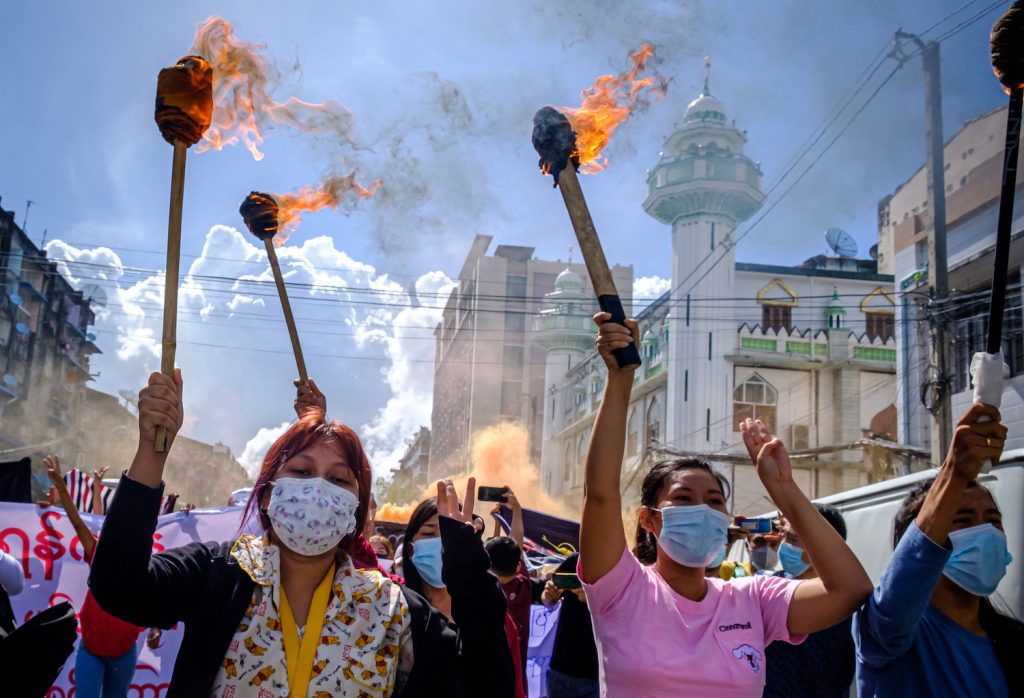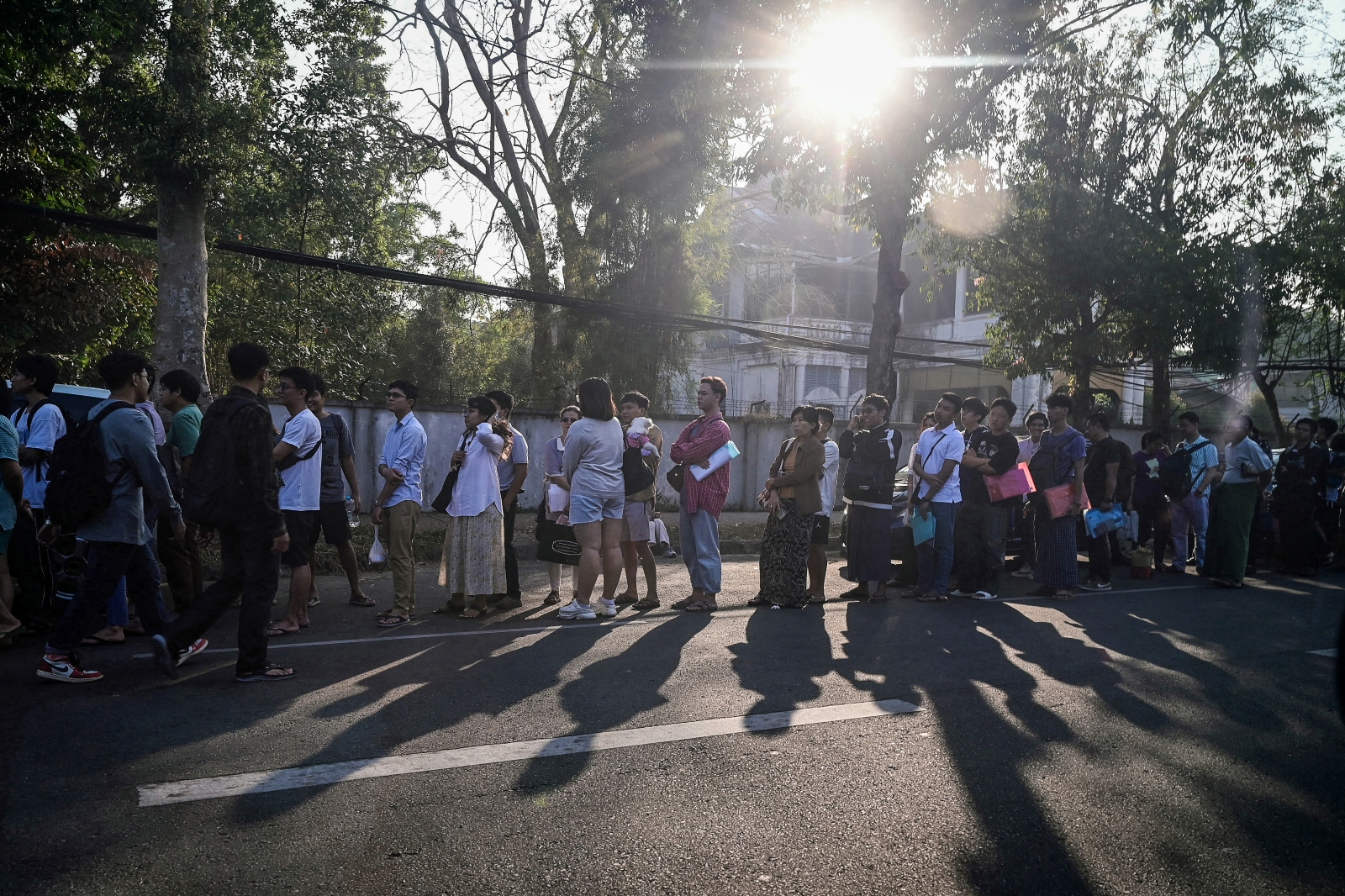The World Bank has warned in a new report that Myanmar faces severe economic losses and a doubling of poverty as a result of the combined impact of the coup and COVID-19, with the military regime unable to govern effectively.
By FRONTIER
Already weakened by the impact of COVID-19, Myanmar’s economy is expected to shrink sharply this year with “damaging implications for lives, livelihoods, poverty and future growth”, the World Bank has said in its latest Myanmar Economic Monitor.
The dual crises of the February 1 coup d’etat and the COVID-19 third wave will knock 18 percent off Myanmar’s economy in the fiscal year ending September 30, a bleaker forecast than its March projection of 10pc GDP contraction. The latest estimate means the country’s economy is around 30pc smaller than it would have been in the absence of COVID-19 and the military takeover.
The report makes clear that the shrinking economy will be devastating for many families that have only recently graduated out of poverty.
“The loss of jobs and income and heightened health and food security risks are compounding the welfare challenges faced by the poorest and most vulnerable, including those that were already hit hardest by the pandemic last year,” said Ms Mariam Sherman, World Bank country director for Myanmar, Cambodia and Laos.
The report’s gloomy outlook is a scathing assessment of the junta but the impact on impoverished communities also raises a dilemma for the anti-military resistance, which has sought to starve the junta of resources and legitimacy by disrupting key industries and cutting off revenues to the state.
It will also add pressure on the parallel National Unity Government to work with ethnic communities to develop a pathway for channeling humanitarian aid and emergency assistance into the country to alleviate some of the worst impacts. The NUG is also yet to clarify how international partners can deliver aid in junta-controlled areas, and what form or level of engagement with the military authorities it considers acceptable.
But in a sign that the NUG is softening its approach to businesses operating under the junta – potentially because of concerns over employment and welfare – its Ministry of Planning, Finance and Investment issued an official investment guidance this month in which it distinguishes between pre-coup investments and new deals with the regime, which it says it will not honour.
Those who invested before the coup should weigh up whether they are doing “more good than harm” by staying in Myanmar, said NUG finance minister U Tin Tun Naing. “They should stay only if the answer is yes,” he said.
The Myanmar Economic Monitor is the first major analysis of Myanmar’s post-coup economy. The findings reflect that, almost six months after seizing power, the junta has yet to establish effective governance over the country and its economy.
Economic activity has been hit by reduced mobility and incomes, protests and labour shortages, as well as the ongoing disruption of critical business services, including logistics and telecommunications, and public services such as health and education, the report says.
The study warns that the share of Myanmar’s population living in poverty could more than double by the beginning of 2022, compared to 2019 levels. Even prior to the coup, in October 2020, around half of all households had reported reducing food or non-food consumption in response to the surge in COVID-19. With savings now drained even further, additional declines in household consumption and nutrition levels are expected.
“The World Bank report confirms observations from the garment sector and others: jobs, incomes, and indeed people’s lives are affected by this crisis. Many people worry about their lives right now because of the economy and COVID,” said EU ambassador to Myanmar Mr Ranieri Sabatucci.
He cautioned that in responding to the coup efforts should be made to minimise the economic impact on ordinary people.
“I don’t think that being against the coup should be the same as risking people’s lives – there are better ways,” he said. “EU companies, for instance, to a very large extent, behave smartly and responsibly, continue to work with the right people, are transparent and think long-term even under very difficult conditions.”
The near-term economic outlook will depend on the public health response and the impact of containment measures, the junta’s actions, the persistence of the civil disobedience movements, the political and security situation, and the responses of the private sector and external investors and trading partners, the report noted.
“Stay-at-home measures and precautionary behaviour will restrict mobility, further weaken consumption and investment, and result in additional disruptions to businesses’ operations,” it said.
“While there were initial signs of stabilisation in some areas in May and June, with mobility improving and logistics disruptions easing, overall economic activity remained very weak and a further contraction is likely from July onwards due to the recent surge in COVID-19 cases,” said Mr Kim Alan Edwards, the World Bank’s senior economist for Myanmar.
With the virus running rampant and the health system unable to cope, the junta has extended a nationwide “holiday” until August 1, and businesspeople speculated to Frontier that the de facto lockdown order could be extended further.
Many Western governments and international agencies face a dilemma of how to deliver aid and support while not being seen as legitimising the military regime.
Japan has recently pledged up to 700 oxygen concentrators among other kinds of aid to the country. On July 25, the EU announced an additional 2 million euros (US$2.4 million) in COVID-19 emergency assistance. It is understood that since the coup the UK has programmed over £20 million ($27.5 million) in humanitarian assistance for this year, including for the virus response, through non-regime actors. Last week officials said China was set to deliver two million COVID-19 vaccine shots to Myanmar and had pledged more.
Apart from the coup and pandemic, two particular crises stand out for the economy: banking and finance, and agriculture.
Despite bank branch re-openings and repeated interventions from the junta-controlled Central Bank of Myanmar, cash continues to be in short supply and access to banking and payment services remains limited, the report noted. It pointed out that as of mid-July, the kyat had depreciated by around 23 percent against the US dollar since late January, which combined with trade disruptions has led to rapid price increases for some imported products, including fuel.
International trade has fallen substantially, due first to protests and boycotts that disrupted the logistics and financial sector and then more recently due to border closures. As a result both exports and imports have declined since the coup, with exports of manufactured products down 18pc in the five months from February to June and imports by 26pc. In July, China, which accounts for half of Myanmar’s land trade, sealed off all its border crossing points with Myanmar, hitting agricultural exports particularly hard.
Agriculture sector activity – the mainstay of the national economy – is set to contract by around 10pc this fiscal year, with likely severe impacts on food security, particularly for the large numbers of poor people living in rural areas, the World Bank said. Rice and cooking oil prices have increased, while farmers have been hurt by lower wholesale prices for some crops, higher input prices, and limited access to credit. “Closures of land borders and logistics constraints have adversely affected cross-border agricultural trade.”
Taken together, these shocks have weakened consumption, investment, and trade, and disrupted commercial operations and the supply of labour and inputs, the study noted.
As part of the monitor, the World Bank conducted a survey in June of 500 businesses (more than 95pc of which were Myanmar-owned) that confirmed the coup had a more severe impact than COVID-19 last year. Altogether 41pc of companies reported facing financial difficulties – 10 percentage points more than in December 2020 – and since February one third have reduced their workforce.
Faced with limited access to financing from banks and other institutions, companies have increasingly relied on loans from family and friends as a major source of financing. The survey found 38pc of firms reported outstanding loans from friends and family in June, a jump from the 26pc reported six months earlier.
“The survey mirrors what the business community is going through. The coup is absolutely dreadful, betraying the Myanmar people as well as investors like us who were enticed to put our money in Myanmar by Thein Sein,” said an East Asian businessman with investments totalling millions of dollars.
The National League for Democracy-led government at least had a plan on how to respond to the pandemic’s economic impact, he said, referring to the policies spearheaded by now-detained deputy finance minister U Set Aung. “The junta hasn’t got a clue.”







